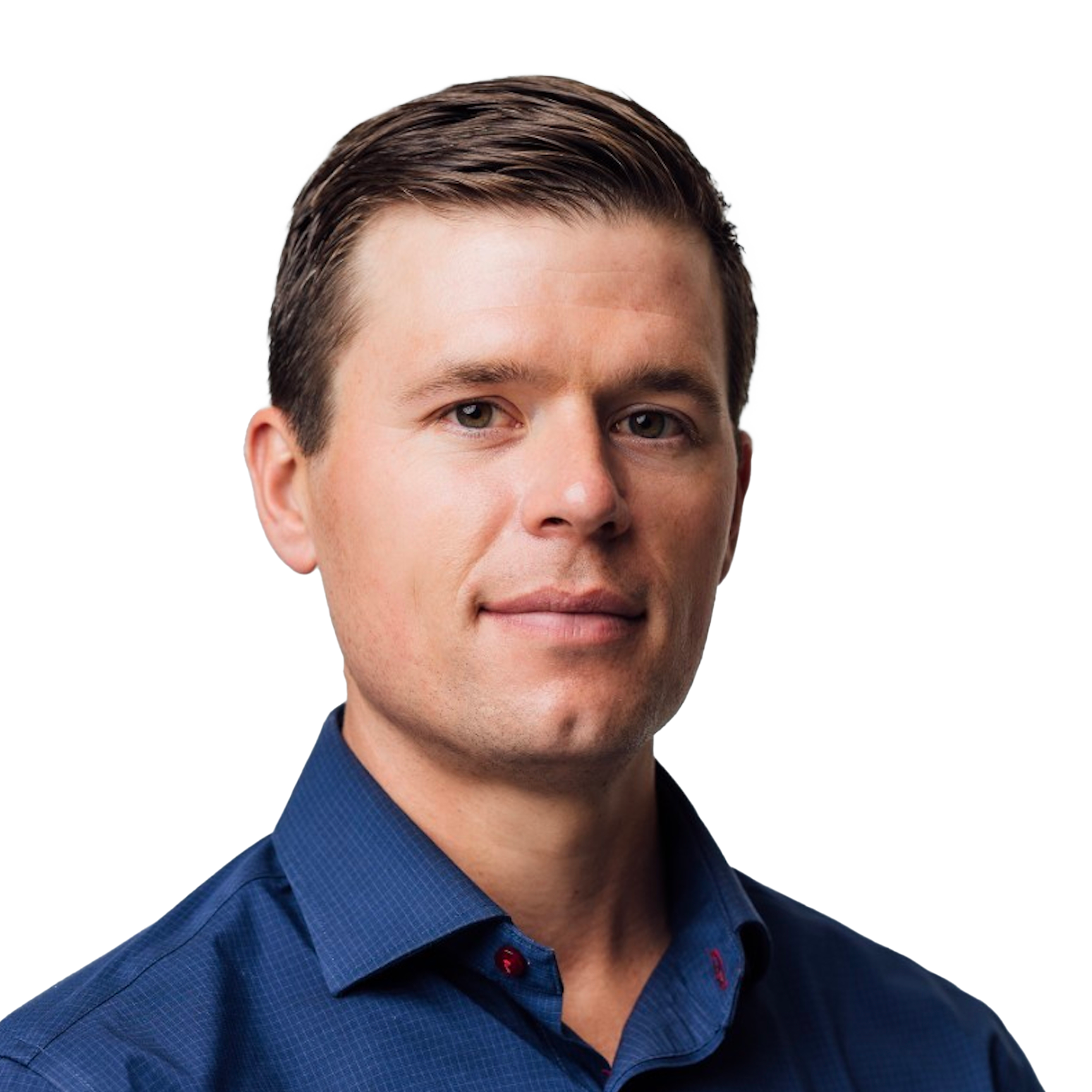
BACK TO PODCASTS
Allison Whalen
CEO
|
Parentaly
Episode #
10
Tracy Young, co-founder and CEO of TigerEye, talks with Allison Whalen, CEO of Parentally. The discussion explores the intricate balance between personal growth, family life, and career development, offering a wealth of insights for individuals and companies navigating the challenges of parenthood in the professional world.

Tracy Young, co-founder and CEO of TigerEye, talks with Allison Whalen, CEO of Parentally. The discussion explores the intricate balance between personal growth, family life, and career development, offering a wealth of insights for individuals and companies navigating the challenges of parenthood in the professional world.
From Minnesota to Parentally: Allison Whalen's Journey
Allison Whalen's narrative begins with her childhood in Minnesota, a place she once vowed to leave but returned to with her own family for its community and educational opportunities. This reflection on her roots sets the stage for discussing the impact of upbringing on personal and professional growth. Allison's stories about her parents, particularly her mother's part-time career as a speech pathologist, highlight the subtle yet profound influence of parental role models on our perceptions of work-life balance.
The Genesis of Parentally
They transition to discussing the inception of Parentally reveals Allison's deep commitment to addressing the disconnect between parental leave policies and their practical implementation. She shares her own tumultuous return-to-work experience post-parenthood, which led her to question and eventually redefine how companies approach parental leave. By focusing on meaningful work, intentional planning, and supportive re-onboarding, Parentally aims to transform parental leave from a potential career setback to a strategic advantage for companies and employees alike.
Leadership, Culture, and Change
Beyond the specifics of parental leave, the conversation delves into broader themes of leadership, corporate culture, and societal change. Allison underscores the importance of empathy, mentorship, and continuous improvement within organizational leadership. She advocates for a culture that values quick iteration alongside sophistication in work, a balance that nurtures innovation and growth.
Marketing strategies and the significance of LinkedIn as a tool for engagement and thought leadership are discussed, showcasing how Parentally leverages digital platforms to foster connections and support within the HR community.
A Call for Inclusivity and Support
One of the most poignant aspects of the interview is Allison's call for a more inclusive and supportive approach to parenthood in the workplace. She emphasizes the need for societal and policy changes to ensure that parental leave is not just a privilege but a right accessible to all. Through her insights, Allison invites companies, leaders, and individuals to reflect on how they can contribute to a culture that supports working parents, enabling them to thrive in both their personal and professional lives.
Podcast Transcript
Tracy (00:00)
Welcome to Path to Growth. I'm Tracy Young, co-founder and CEO of TigerEye. Today we are joined by Alison Whalen, CEO of Parentaly, to discuss all things growth. Alison, welcome.
Allison Whalen (00:12)
Thank you for having me. I'm so excited to chat today.
Tracy (00:15)
So tell me about growing up. Tell me about mom and dad, where you grew up, how that was to be you as a child.
Allison Whalen (00:22)
Oh man, it's boring. I grew up in Minnesota. I had, you know, very typical childhood in the sense that I don't have a lot of major, major challenges or memories or anything like that. I mean, I guess my memories of childhood are sort of what.
I don't know if there's anything super noteworthy, other than when I left when I was 18 from Minnesota, I said, I'm never coming back. Then I took off, I went to college, I went to grad school, I lived on both coasts, I lived in South America. Then I had my first kid and came crawling right back to Minnesota. So the boringness, I shouldn't say typical childhood, it was more like the boringness of growing up in Minnesota was something that became suddenly very appealing to me once I had a child of my own and my parents are here and so we moved back and I really...
depended on like that community of childhood.
Tracy (01:15)
Mm-hmm. Yeah, I remember being so bored and hated my hometown as a child. And then as an older person with kids now, I was just so lucky to be born and raised in a totally average, totally safe American suburb.
Allison Whalen (01:31)
Exactly. I mean, at the time I was just so happy to leave. It felt too safe, too, you know, there wasn't a lot of diversity, which is still kind of something that we struggle with here is when you spend so much of your adult years living on the coast where there are folks from abroad, you know, you have more international religions and people from all different walks of life. And then to come back to Minnesota, that was actually like the biggest shock for us was
It is a very different culture, but it's also very quiet and very, you know, slow moving in a way that I think is really nice for our kids. And it's also changed a lot. So like our kindergartener goes to a Chinese immersion public school, which is like incredible that we have access now. And that's becoming at least in Minnesota much more common where you can have language immersion schools and other languages where they get exposure to other cultures and whatnot.
Tracy (02:18)
Oh wow.
Allison Whalen (02:31)
We're very happy here, but it is definitely something that we sort of talk about and struggle with of like in our minds, we're so in our husband group in Taiwan, you know, and then we're in Minnesota, which we actually love.
Tracy (02:40)
Love you.
Yeah.
Yeah. So tell me about mom. What did you learn from her?
Allison Whalen (02:50)
My mom, it's funny, when I was in college, I wrote an essay that got me in the audience of the Oprah Winfrey Show, now I'm dating myself. And it was when the movie, Mona Lisa Smile came out, which was all about, I think they were like the first, something to the effect of like the first generation of women that went to college at Wellesley, I think it was. And...
I wrote this essay about the impact that my mom had on me and my education to win a seat in the audience. And I remember my mom read it and said, really? Because to me, my impression of my mom was that she was this go-getter career, you know, really focused on, she was a speech pathologist. She was very passionate about her work. But the reality is she actually worked part-time almost my entire childhood. But I didn't see that as like, oh, you're only, you know,
that was a bad thing. If anything, it was like interesting to me that my mom had that reaction of, oh, I'm so happy that was your impression that I was very career focused because she had actually figured out how to work part-time and still continue to grow within her career. And my impression as a child was just, my mom loves her job and my mom worked. And so I think that was a big ah-ha as I was an adult around like,
Tracy (03:43)
Yeah.
Allison Whalen (04:10)
At least my generation, it feels like there is, or the narrative is a little bit more, if you're part-time, you're sort of leaning back. And I don't think that that's necessarily true, but that's sort of this thing that we've maybe bought into over time. And so it was really interesting for me to see that my impression as a child was not that.
Tracy (04:31)
Right, she worked two jobs. Crushing it at both apparently. What about dad, what'd you learn from dad?
Allison Whalen (04:33)
Right, exactly. Yeah.
So my dad, the thing that we always talk about, he was an engineer and my sisters and I all swam competitively throughout our childhood in high school. He never once missed a swim meet, not even one time across the like 12 years that we were all cycling through high school swimming, which is absolutely insane because those swim meets started at like three or 330. And it's yet again, another thing that we didn't really realize until we became adults. And we're like, wait a minute.
how are you at every single swim meet? At three o'clock and he would say, well, you know, I could go in at five or I could start my work earlier. I could do some work at home so that I could leave early to make it to the swim meet. And it's honestly a little bit of a source of guilt for me now because it's almost like I grew up with this association of like that was, it just felt so good as a kid to see that my dad was always there.
Tracy (05:11)
Oh, that's so sweet.
Allison Whalen (05:33)
And I struggled with that. Like I missed a huge thing for my son last week because I was traveling to a really important meeting and that just killed me. Because my childhood version is my parents were always there, they were always at the most important things. And so I was talking with some of my girlfriends about that because that's definitely something that I deeply respect from my dad. But the takeaway that I had in talking to some of my friends about this is, it's really how you make the child feel. And that...
Tracy (06:00)
Yeah.
Allison Whalen (06:01)
is the way I felt that way. And that's why I have such fun memories of my dad always being there, because to me, it was like, wow, he made a big effort to always show up. And you don't need to always show up to make them feel that you're always there and always showing up. So I think a lot about that.
Tracy (06:19)
Yeah, I also think just listening to you talk, I think just like founder, CEO, type A moms are always way too hard on themselves. You know, you missed one game, it's gonna be okay. I know how much you love your children. Tell me about your company, tell me why you started Parentaly.
Allison Whalen (06:28)
Yeah.
I started thinking about Parentaly back when I was working for a different startup that eventually would be acquired by WeWork. And at the time, it was a very typical venture-backed startup, I think raised over $100 million during that period of time. And there weren't a lot of parents. And I had my first child, I went on parental leave, I returned to work, and I could not believe what a disaster it was when I returned to work. Because
Tracy (06:50)
Thank you.
Allison Whalen (07:06)
My company loved me. I was a high performer. They wanted to invest in me. They wanted to retain me. I returned and I was leading the enterprise sales team. Everyone had missed their goals. I hadn't figured out the right comp plan for while I was out. My manager hadn't really done the right things because he didn't know what those things were and I didn't tell him what to do. And sort of the list of all the bad things at work went on and on and on. And I thought this is ludicrous because
Companies have these parental leave policies to support, literally the only reason they do this is to support working parents, because it's hard on them, it's expensive to pay people to not be at work. The government doesn't usually in most states pay for it, so, or help pay for it. So these companies are rolling out these policies to be supportive. And yet if the end result is that it messes up the business and that the new parent returns to work and feels stressed, overwhelmed.
like they should just leave and start fresh somewhere else, which is how I felt, then this is a massive problem. And so that was really when I started focusing on this, I started talking to other people I went to business school with, didn't matter if they were at the smallest companies to the largest corporations, everybody had some degree of that story, whether it was my manager was really unsupportive or didn't know what to do or, you know, I got.
I missed a performance review, and so my promotion path was delayed by two years. I mean, these stories just went on and on and on. And that's when I became really obsessed with this idea that we don't need to just accept that stepping away for a few months means that we're all gonna get penalized. And not just for mothers, because now fathers are taking leave as well, a very long time at a lot of the large progressive organizations. And so this problem gets even larger when we think about...
Non-birth parents now having access to much longer leave as well.
Tracy (08:58)
It feels like how companies' parental leave policy and how it's put in place can be like a competitive advantage in recruiting and retaining the best people. Can you provide examples of when managed effectively, what can become an accelerator for their business on just like retaining the best talent? Like what can companies do in a simple, simple way when it comes to parental leave?
Allison Whalen (09:29)
Yeah, I mean, I think obviously they can hire us. We can come in and do what we do. But there are certain things that I think companies should be thinking about overall, like a few things that they can do without bringing us in. The biggest reason why people quit and are unhappy, have terrible productivity when they return to work is when the employees feel that their work is not meaningful. And you can get ahead of that.
So when we run our coaching program, we start, everyone wants to come in and start building a coverage plan. We start with a vision session with their Parentaly coach, which is what things are gonna get you super motivated to return after your leave, and what things are very energy draining to you right now. And what we do is we say, okay, great. How cool is this that this is a once or twice in a lifetime opportunity for you to completely wind down your role?
and reinvent it when you return. And so as opposed to approaching a parental leave as this like in incredibly stressful moment where you're like, I just have to cover these things and make sure that the boat stays afloat or whatever. If you refocus this or sort of reposition it to be, hey, this is a really cool opportunity. Let's structure this so that we are going to find the problems right now. What are the meetings that are wasteful or
the things that I'm doing that just feel really, really junior that I'm so sick of doing. And let's solve those problems as part of the coverage planning process, maybe even sunset them forever or take them away from you forever. And then when you return, let's return with intentionality and let's make it a role that gets you really excited to leave your four month old at home, for example. And it sounds very like a little woo when I talk about it. But honestly, this works.
Because when you start to build your plan and you treat parental leave like a business milestone, which is really what it is, and a career milestone, you can get amazing results. And so we try to reposition parental leave as this really important career inflection point. And then the second most important thing is how does the manager build a strong re-onboarding plan? Because that first like 30, 60, 90 days after someone comes back from parental leave,
is really a game changer for most people. It's where you will either put them on a path to completely accelerate their career growth and be super happy at work, or you put them on this path of feeling behind, overwhelmed, unhappy. And the key is actually to slow down, to speed up. And so when they come back, you're not having them dive into execution right away. You're really focused on giving them the opportunity to learn, do what we call listening tour.
build their plan and then realign with their manager on what should I be doing as I return to work? And again, like that becomes a career accelerator because they come back and instead of being told, oh my gosh, we're so behind in all these projects and like take on all this stuff and just dive right in, instead they're taking a fresh perspective. They've been out of the business for a few months and oftentimes they're able to come in and actually challenge some of the original plans and make them better.
Tracy (12:46)
I love that at Tiger Eye, we're constantly talking about Kaizen. It's a word we use every single day as a team, the Japanese philosophy for continuous improvement. It's easy for us because we're a small team, we're a startup. Most of us have worked together before, so we can make decisions every day to change. But I can imagine that most companies, even to just come up for breath and re-evaluate everything you're doing
the things that you actually hate doing? What are the things that actually excite you? And just getting a chance to treat this moment of coming back from leave, to reevaluate the stuff you have to do, and really have an honest conversation about what gets you excited, what makes you hate your life at work, and to sort of reset and restart, and be able to perform for the business, and perform and grow for yourself, I think is really, really cool to hear.
Allison Whalen (13:15)
Right.
I think even at startups, it's also helpful to pull back. Because I find that at least for us, it's so easy to just stay in the weeds. We've got a lot of work going on. And so we've had a handful of folks go out on parental leave in the past year. And every time they return, it's almost like a shock to the system in a really good way. It's like they're really seriously questioning, why did I spend six months doing this thing when I could have paid someone $5,000 to just take the entire thing off of my plate?
Tracy (13:50)
Oh, yeah.
Yeah.
Allison Whalen (14:12)
Coming in, I think that there are definitely benefits at large organizations because they don't have that continuous improvement mindset, but then at small, it's like actually like thinking bigger can be a really hard thing to do at a fast moving company where you're really, really focused on moving fast.
Tracy (14:24)
Mm-hmm.
Yeah. So what's the number one thing managers should offer to their direct reports going through parental leave?
Allison Whalen (14:37)
I think it is, I would say two things. One is to talk about their career goals before they go on leave, which sometimes people don't like when I say that because they get a little triggered and they say, well, you know, I don't wanna put pressure on this person and what if their career goals change and I don't wanna open up that conversation. My counter argument to that is it's totally fine and we should expect that their career goals may change.
but by you talking about it before they go on leave, you're showing that you care and that you're not counting them out and that you're invested in their success. And of course, if they change their goals or their priorities, of course, you will work with them at that point in time. But we have seen consistently people who go through our coaching program, they rave about the fact that their manager is talking about their continued career growth before they even go on leave. Second thing would be a strong re-onboarding plan. You just can't...
That's just so, so important. Giving people the space. And the number of times that we hear people come to us on LinkedIn and they say, no one even knew that it was my first day. I showed back up at work and nobody even knew it was my first day. No one had prepared anything. I didn't even have like the login. The login had expired to my laptop, so I couldn't even get in. Stories like that where it's like.
It sounds kind of silly sort of when you say it out loud, but there's this emotional piece around your first day back. And if you show up virtually or otherwise and no one has planned anything and no one has prepared at all and nobody even knows it's your first day, it just sort of kills you to your core.
Tracy (16:18)
Yeah, yeah, like no one cares about you. Why am I leaving my family and my baby to come back here where no one cares?
Allison Whalen (16:22)
It's like
Right. And we see it all the time from people who are really good intention. They're just really busy. They're moving fast. You think, oh, please, Allison has been here for years. She knows exactly what things are like here. But it's like, I don't know. And it happens all the time. And so it's funny because it's like, we almost felt silly in our manager training putting a slide in there that's like, remember to tell people when the first day is, you know? But we need to make sure that we are on top of this and that we actually have plans for people when they return.
Tracy (16:56)
Yeah, I love the advice of having conversations about their career goals, because that's signaling that, hey, just because this big life event is happening, and you know, miracle life is happening to you, we care about what you want professionally. And also we expect you to be able to achieve your goals, even as a new mom, even as a new dad, even though you're gonna be off for a few months taking care of the family.
Allison Whalen (17:14)
Yeah.
Yeah, I don't know. Right. And I don't know if you would agree with this. I'm curious to get your perspective on this, but I would always feel very, I would have like a visceral negative reaction each time that I was pregnant preparing to go on parental leave if anyone implied, oh, or said, oh, we'll see how you feel when you return. And the implication is like to me, the implication was always
they're starting to discount me. They're starting to wonder, like, I don't even, you know, we don't know how you're gonna feel. We don't know if you're gonna be as bought in when you return. We don't know how you, and I just, something about that is very triggering to me and negative. And it's like, look, we should be talking to people, asking what their career goals are. And you can say, of course, if anything ever changes in the future, we can, you know, talk about that. But it isn't like, oh, no, we'll just wait until you come back and we'll see how you feel.
Tracy (17:52)
Yeah.
Allison Whalen (18:20)
I don't know. I always just felt took that very negatively. And maybe people never said that to you and you had the benefit of not.
Tracy (18:25)
I have a shared experience here. I had my board, there's a really important decision that was obviously the right decision, but board members were like, let's wait until you come back from maternity leave and then we'll make that decision that everyone knows is right. It's like, but that's gonna delay the right decision by like three or four months. Why can't I make that now? No, I totally get that. I think for those...
Allison Whalen (18:43)
Right. I know.
Right.
Tracy (18:54)
listeners who might be confused here, they're in that statement alone, there's some assumptions that are made, right? That you, because of your state of pregnancy, you might not be making the right decision or you might not be thinking in the right way, which is a bit insulting.
Allison Whalen (19:01)
Yeah.
Right, exactly. Or that we don't know if you will change. So we don't want you to make any decisions until, it also implies that when you return, you're also stable, which I'm like, hey, all of us are always changing and always changing our minds and all that, you know? And so there's something about the pregnancy piece that I always thought, well, like, I don't know. It just rubbed me the wrong way. And I think part of it comes from a lot of especially
birthing parents, mothers, if they are pregnant, get this insecurity that is largely something coming from society. And it's the way that we, I don't know. There's something around that insecure piece that we hear a lot of people say, I've never felt as insecure as when I was pregnant, preparing to go on. I was insecure about what people thought about me, what they thought about my dedication to work was,
I was insecure about truly if I would be able to deliver the same way that I deliver now. And so there's just like a lot of this insecurity that we hear about that I personally experienced. And so when someone says, oh, let's just wait because you're not ready to make a decision, it's like, it kind of just reinforces that insecurity. So I don't know.
Tracy (20:32)
Yeah, I'm glad you're mentioning that because I think as someone who's been pregnant three times now, especially in the late stages, it's like you're physically vulnerable. You can't move as fast, things just don't work, you can't sleep, it's like you're peeing constantly because there's a baby on your bladder. And so you're physically vulnerable and that just creates a lot more insecurity that...
Allison Whalen (20:43)
received.
Tracy (20:57)
There's so much insecurity there already, I think as women in today's world. There's even more with 20, 30 pounds in front of your belly. How do you see the future of parental leave evolving?
Allison Whalen (21:06)
Mm-hmm. Totally.
I am very hopeful that we will roll out a national mandate with government funding that is paid for by taxes, because I live in this world of privilege where all of our clients that we work with offer very generous by US standards, parental leave, paid parental leave policies. So in my world, I'm working with people where their biggest challenge is, how do I step away from work for a very...
long period of time, three to six months, fully paid, and come back and be successful. That is a huge problem, but it's also a very privileged problem. And the vast majority of people in the United States have access to no paid parental leave, which is horrible. And so I'm really, really hopeful for humanitarian reasons, quite frankly, that we pass that and that everyone has access to that because...
It's just really sad to see the haves and the have nots. And I just don't believe that we can live in a productive society where we make individual companies make this decision on if they wanna do this. And as a small business owner myself, I know that I need to offer paid parental leave. Of course I believe in it and I would do it anyway. But if I'm taking out the emotions and I'm taking out the ethical side of things, I actually do have to offer it to be competitive to win the talent that I want to win.
um it's incredibly expensive so it's really hard as a small business owner to actually pay for a 16-week paid parental leave policy and so as a small business owner I would love for the government to help out. I celebrate when I find out that the person who is pregnant on my team is coming from a state where the government's going to help pay for it and so I get very confused about what the pushback is from like the business perspective because at least for me as a small business owner and
You always hear about how we need to be supporting small businesses and the creation of businesses. It's very helpful to me as a small business owner. I would gladly pay tax, like more taxes, to make sure that this is something that not only my employees can have, but everyone else in the United States. So I am very hopeful that the overwhelming majority of Americans do support this. Hopefully we'll get that passed. And I think it's a really big deal. It's a really big problem that we don't provide that.
Tracy (23:35)
Yeah. You talked about how businesses can step up and have a good plan back for parents, dads and moms. What are the ingredients to good onboarding?
Allison Whalen (23:50)
Um, so there's a bit of like the personal side. So make sure you reconnect with them. A lot of people stick sort of jump over that piece. There's a listening tour. There's making sure that each person who covered the work for them while they were out is putting together a summarized overview of what happened, what are the open questions, what are the challenges here, all the links to the documents that you think that they should read to get caught up to date there's how are you going to transition vendor and client.
relationships back over to that person. There's reading through your inbox. There's a lot of stuff that needs to happen just to prepare yourself to then start executing on your job. And so we kind of put like position it as you start with a listening tour and then you move into defining your 30, 60, 90 day plan. But then there are all sorts of things like we have a free manager checklist on our website that has the.
really tactical small things, like add them back into the team meetings on calendar invites, like really small things that you would forget but are really important to get ahead of.
Tracy (24:56)
congratulate them on becoming a parent, having a new perfect being in their lives.
Allison Whalen (24:58)
Exactly.
Yeah, well we tell them to do that right after it happens. A lot of people don't like if they hear that, if the first time they're hearing it is like when they're actually back at work. Yeah.
Tracy (25:06)
Thank you.
Yeah, I mean, I remember with all three of my kids, I don't think, you know, just like the broken sleep was so hard, even though I was working at whatever, whenever I went back to work all three times. I mean, I wouldn't feel like I was even 90% until the baby was like six or seven months old, right?
Allison Whalen (25:36)
Oh yeah, same.
Tracy (25:39)
It's so hard. So thank you for sharing some onboarding tips and it looks like there's checklists and good resources on your website as well.
Allison Whalen (25:50)
Yeah, we have a lot of free resources on there because we do not work B2C, so we don't sell anything that we do directly to new parents or expecting parents. And so honestly, we make a lot of our resources available for free for them because we have a lot of people coming to us sort of like begging for help and we don't sell directly to them. So you can go to our website and get all sorts of free stuff.
Tracy (26:13)
Mm-hmm. What's, what's, what marketing strategies has been most effective for your business?
Allison Whalen (26:19)
We are all over LinkedIn and LinkedIn has been incredible for us as I know. I know you've also focused on LinkedIn as well. Um, it's been amazing because we, I started a few years ago posting, you know, three times a week and have tried to increase that over time. And it's incredible because one, I think we've gotten pretty good at posting a lot of very helpful nuanced information.
Tracy (26:21)
Mm.
Allison Whalen (26:46)
And so it stands out. And I think the most interesting piece is, sometimes we use it for lead gen, like people will discover us on LinkedIn and come in, but more often than not, it's people who we've met with who then are reading our stuff day in and day out. So I view it almost as more of like a mid funnel thing where we're keeping them warm, we're staying top of mind as opposed to necessarily like driving inbounds, but that happens as well.
Tracy (27:01)
Mm, I love you.
Allison Whalen (27:16)
Um, so we've done that. We've also had a ton of success with webinars, but we take this approach of like, what is the most helpful thing? Like, I think that there's a really high bar to get people to show up to a webinar. I barely go to anything ever. Uh, and so we really push ourselves to say, what is going to have, what, I mean, HR is being inundated with a million and one things, what is going to get them to actually show up? And so we've gotten.
pretty good at doing that. We've even paid some other vendors to sort of run webinars for us. And the number of people who show up and the quality is so much lower than when we just do it ourselves. And so that was really exciting to see is when we've built our own helpful webinars that are not very Parentaly centric. Like we don't really pitch our services in it. It's more like helpful resources around parental leave. That's been super successful. And then we've started to do more events.
So dinners and sort of like old school networking type stuff just kind of works well still.
Tracy (28:16)
Yeah, there's a strong community. As someone who reads your post and your content, I mean, you guys are truly business partners to these HR leaders and HR folks in this topic.
Allison Whalen (28:23)
Yeah.
Yeah, and like, I just think you can't fake passion and interest. And I mean, this is the stuff that we really care about and like, and everyone who works here really, really believes in what we're doing. And so it makes it easy to create content to put out on LinkedIn, you know?
Tracy (28:30)
Mm-hmm.
Mm-hmm. What are you looking for in people you bring in now versus four or five years from now?
Allison Whalen (28:52)
Oh man, I don't know what I'm going to be looking for in four or five years. I feel like, I think, yeah, I think it was you that said the last time we spoke that every day you're in the biggest job you've ever had. That's how I feel. So like four or five years from now, I can't even imagine. Um, right now we actually just defined our company values because we realized. It was a fun exercise because we were realizing that we were going through all these interview processes and we weren't.
Tracy (28:56)
How about just now then?
Allison Whalen (29:18)
We were kind of looking for the things that we already have in our existing culture, but we hadn't said what they were. And so it made it really hard to look for that. So like some of the things we look for, solving big problems, people who really are passionate about this problem, it's really important. We just see people do better work when they care. And that doesn't mean that they have to be a parent. We have actually, I wanna say like 30% of our employees are not parents. So you can be really interested and passionate about a topic and not have it be like a personal.
thing to you. Exactly, maybe someday, maybe not, I don't know. But they feel very strongly and they feel very invested in the problem. We're also really, to your point of kai zen, we're very much focused on move fast, then iterate. That is so important. And where we've made some mistakes is people who are, I don't know, I'm a CEO and I'm in the weeds still. No one should be above doing.
Tracy (29:48)
At least not yet.
Allison Whalen (30:17)
I mean, not all the time, of course, but like I, we need people who are like really comfortable executing and getting things done really quickly. And oftentimes if someone came from a really large organization, they'll struggle with that, but sometimes not. We've had some success hiring people from larger organizations. But yeah, I think really what we're looking for are people who are really good at moving fast, but also being very sophisticated with their work.
which is hard. We talk a lot about where does perfection matter and where does speed matter? Because oftentimes you're making a choice between one or the other. And sometimes perfection does matter. And we work with enterprise, like Fortune 50, Fortune 100 companies. And so you can't be a scrappy startup and make
silly mistakes in some situations with those clients. And so we spend a lot of time talking about perfection versus speed.
Tracy (31:20)
As a founder, what are the most important responsibilities you have to your team?
Allison Whalen (31:26)
I think motivation and energy. And the reason I say that, or what I mean is when I had my third child, I went on parental leave. And when I returned, I asked our VP of growth who was sort of running the business in my absence, I said to him, how did things go? And he said, you know, it was a little rough. And I thought, oh my gosh, here I am. I run this business saying that we can solve this and here.
what, I wasn't able to prepare my team for my own parental leave. And he said, no, we were very prepared. The actual business ran great in your absence. The coverage plan was great. We're doing great. But he said, I didn't actually understand how important you being here and the charisma and energy and direction, how much that mattered until it was gone.
which really has stuck with me. And I remind myself of that because I do fancy myself more of a doer and I like to execute, I like to build. And I have to constantly remind myself that actually my biggest role is to keep people focused, motivated, inspired, happy. And that a lot of that is simply how I show up and how I talk about things and how I share really exciting news and celebrate wins.
And so to me, when I went on leave and came back and he said, that was the biggest challenge, that was really, that stopped me in my tracks. And I think about that all.
Tracy (32:54)
You're such an authentic communicator. And you're right, high energy with charisma and just this care coming off of you. I'd imagine your team really loved working for you.
Allison Whalen (33:07)
I mean, I hope so. I really love working with them. And I, you know, I, yeah, I think we have a good thing going on. What do you think?
Tracy (33:10)
We're so humble.
Does your, do your kids know, do your kids know what you do? Do they understand what you do for work?
Allison Whalen (33:20)
Do they know what I do? Kind of. The way I describe it to them is I help people make plans so that they can go and leave, focus on their families, and then come back to work and be happy. So they understand it at that level. Although back to the guilt, the mom guilt story, when I told my son I couldn't go to his thing, and he said, but aren't you the boss? Can't you just reschedule? And I said, well. It was like, you know, being the boss doesn't mean you always get your way. In fact, it means.
Tracy (33:41)
He's right about that.
I'm sorry.
Allison Whalen (33:48)
need to think about other people. So yeah. So I don't know that they really get it, but...
Tracy (33:52)
I think, yeah, I tell my kids, they're young, they're all five and under and yours, I know, are too. I tell them, like, well, you go to school and we go to work and then we see each other for dinner. And then they kind of, he just kind of, the five year old is just like, oh yeah, you guys are doing some business stuff. But he always makes a face when he says business, like that sounds really boring and lame.
Allison Whalen (34:06)
Yeah.
Well, and my husband works for Target corporate and they of course think that my husband works in a Target store, which they think is the coolest thing ever. So they're like, dad works at Target and mom, we don't really know what she does. She or what they actually my six year old says that I'm on podcasts all the time because I think it's when I think it's because he used to we used to have a nanny so he would come home and I was constantly saying.
Tracy (34:17)
Mm-hmm.
Yes.
Yeah.
Allison Whalen (34:41)
I'm on a podcast, so you gotta be quiet, don't come into my office. So maybe he thinks I'm a podcaster, I don't know.
Tracy (34:51)
Trust in leaders can be made or broken when things get tough. How do you deal with the crisis?
Allison Whalen (34:59)
I think I'm really good in a crisis scenario. We were just talking about this at our last off-site where there's a woman who was the first hire at our company and she was sort of sharing with the newer folks. She said, yeah, Alison's very calm under pressure and it's almost like the more things are going bad or wrong, the more calm she is and more like assertive and makes fast decisions. But she said, but I kind of suspect she's like a duck.
where like they look very calm on the surface and then yeah, their legs are just going frantic underneath like panicking. Yeah, I don't know. I mean, I think I just, I'm a, we also talk a lot about anagrams. I'm a six, I'm a worrier. I always think about what is the worst case scenario, but I'm a quote unquote healthy six in the sense that I get a lot of security and confidence from being.
what a person who always asks, what is the worst case scenario? So that when those things happen, which it's never the worst case scenario that happens, but when something bad happens, usually already thought through what I would do. So I don't know, maybe it's like my type six-ness that I'm like, I don't know. Things just don't, I don't wanna say I'm unflappable, but I just don't like really panic.
I panic about really small things. I have anxiety about really small things. And then when it's an actual crisis, I think I'm actually thriving or doing better then.
Tracy (36:29)
You know, you sound like me. I just go into like, all right, face the reality, Tracy. There's nothing you can change about the past. They're like, but you can make decisions to try to fix this or try to make this better. So let's start breaking it down.
Allison Whalen (36:33)
Exactly. Right.
Yeah, and I think I'm not afraid to like have the hard conversations and run right at something. And yeah, I totally agree with you.
Tracy (36:51)
Tell me about one person who's helped you become the leader you are today.
Allison Whalen (36:57)
Oh.
This might be a cop-out answer, and I'm not going to say these people's names, but I think more about the leaders that I don't want to be like.
Tracy (37:09)
Oh, yeah, yeah. Those are data points too and learning moments too.
Allison Whalen (37:12)
Yeah, then the ones that I do.
Tracy (37:15)
Okay, so what is it? Give me an example. Like, what did you see a leader do that you promised yourself you would not do when you were.
Allison Whalen (37:23)
I have seen leaders use fear as a motivator or shaming or, yeah, like, what's the word where it's like emotional security? There's a word for that, like where you want to make sure that people feel like this is a safe place to fail and that you're not going to judge their core, like who they are. You know, people can make mistakes. It doesn't mean that you're not smart or you're not whatever.
Tracy (37:26)
Hmm.
Allison Whalen (37:52)
And to me, that's really important. I want people to feel, yes, I have high expectations, but also this is fun and we should be okay making mistakes and we should be a safe space to learn and move forward. I would say like the leader that I've probably learned the most from is my last manager. When I was at my last company, Megan Bowen, she was a phenomenal manager in the sense that she was really good at
turning chaos into order. And I learned a lot from her about how can you, if you have really strong people reporting to you, which I think I was a pretty strong performer, what I needed from her was direction. Like I didn't actually need that much from her, but I needed her to sort of listen to me, hear what I was worried about, look at my laundry list of things that I'm working on and help me figure out what matters the most and be a thought partner and hold me accountable to it. And...
Tracy (38:24)
Hmm.
Allison Whalen (38:51)
I think that was a really helpful experience for me that I think about now a lot and try to utilize with my direct reports here where I think that if you have strong people, you wanna be the person that helps them do better.
Tracy (39:06)
Yeah. So what do you think her super power was? Was it just listening?
Allison Whalen (39:10)
I think she was really good at listening, organization, prioritization. And I think she was not afraid to get into the weeds, to actually dig into problems really, really deeply, to start answering some of these questions herself. And I think where I saw some issues at my last company with certain folks who were hired senior, who were brought in and then didn't work out and they left, they all just
Tracy (39:29)
Mm-hmm.
Allison Whalen (39:39)
they weren't able to balance the macro with a micro. Like they couldn't go in the weeds and then zoom out. Effective, that's really hard to do. And she did a really good job of both.
Tracy (39:46)
Yeah.
Yeah, yeah, yeah. I definitely had a manager who was very high level. He was always on a plane and actually like a totally nice dude. But we would never go deep on any of the problems. And what that signaled to me was that he didn't actually care about the problems. He was totally fine with like stuff being on fire all over the place, as long as he didn't have to fix it, which is just not very inspiring.
Allison Whalen (40:07)
Right. Yeah.
Right, exactly. But it's hard because it's like, you don't want that person to go in deep too much. So it's like, do they have a good judge? Like, are they able to judge when it makes sense, when it's helpful, when it's important?
Tracy (40:26)
Alison, I could talk to you for another two more hours. But here's the last question. I feel that especially in STEM and sales, we end up, you know, we spend all this time educating women into the workforce. And then they, you know, they get pregnant, they have their first child and they leave the workforce. And it's so sad because there's so much talent, so much hard work ethic.
Allison Whalen (40:29)
Yes.
Tracy (40:54)
and then we just lose them. We want them paying taxes, right? We want them, of course, to be great moms also, but I really feel that you can have both. And so what is some advice you would give to women who are so ambitious, who have maybe had their children and it's hard right now, or women who are so ambitious and are thinking about becoming a mom and just not really knowing how to navigate this new world as like mom and...
you know, professional whatever.
Allison Whalen (41:26)
Ugh, that's hard. I think...
What I would say is you do have to work differently once you have children for most people. And that's not just for women, that's for men as well. Once you have a new constraint on your time with children, a new priority, it fundamentally requires you oftentimes to change the way that you work. But different doesn't mean worse. And so...
What I like to challenge people to think about is how can you use this as a positive? Okay. You can't work 80 hours a week anymore. Well, how can you rethink your systems to be able to prioritize better or to get more done with less or get the same done with less time? Um, the other thing I would say is like, I actually do think there's a lot, and we don't do this as a business, but I think there's a lot of power in mentorships and role models, and unfortunately we lack a lot of those. And so.
I would recommend people seek someone to have a really honest personal conversation about this because at least I felt when I was pregnant that I didn't see anyone who was thriving, so to speak, as a mother in sales, at least in my small world. And that was really scary. But what I would later discover is that's not true. There are tons and tons and tons of women that are. I just didn't know them.
And once you start surrounding yourself with people who are doing that, all of a sudden it becomes more possible and it becomes less scary. And unfortunately, we kind of have to work hard to find those people sometimes. Last thing I would say is sometimes the system just is not set up to support you. And like, sometimes it is as simple as switching to another company that is more supportive. Like it's not all on the parents to figure out how to.
make it happen. There are certain professions that are much harder, and I'm not talking about STEM or sales. I actually think that I know less about STEM. I think sales is a wonderful profession for parents because it is not the type of thing that requires an 80 hour work week. Whereas you could make an argument that law sometimes like that can be really difficult because you have billables, for example. So I think sometimes there is the reality that there might be.
systems, whether it's at your individual company or within your industry, that is really challenging to overcome. And you kind of have to make a decision if you're going to stick with it, if you're going to throw money at the problem to bring in additional resources to support, or if you're going to take a different path within a different company or different industry.
Tracy (43:59)
Mm-hmm. I was so lucky my parents retired when I started this company and had a bunch of kids. And so having a multi-generational household makes it a lot more possible to do what I do and to make sure the kids are taken care of.
Allison Whalen (44:03)
Hmm
Totally, and I think that people don't realize how often that's happening. And so I think I hear a lot of women, especially, who think, oh, I'm failing. Well, a lot of us, like I have my parents help out all the time. And there are a lot of people that pay for a lot of extra support, whether it's someone to clean their house, or a nanny, or a part-time nanny, because it is really hard. And so, yeah, there's a lot out there, different levers that you can pull, but sometimes it is just, you know,
you need to move to a different company because it certainly is possible to be a very successful, and I mean successful as in happy working parent, as long as the systems are in place to let you do that.
Tracy (44:59)
Alison, thank you for joining us today. I loved our conversation and I think there's just so many great nuggets for managers and HR folks thinking about how to best support their team members who might be going on parental leave and then just advice to women in general. So thank you.
Allison Whalen (45:16)
Yeah, thanks for having me.

.png)













